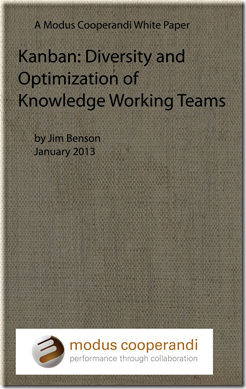Announcing the publication of Kanban: Diversity and Optimization of Knowledge Working Teams – a new Modus Cooperandi White Paper.
Late in 2012, we conducted a Board Walk (a site visit where we meet with teams using kanban or Personal Kanban and help them optimize the board and the team itself) at a client in the United States. There were 15 individual teams, each of which had its own individually designed boards. Each board had a unique value stream, work item types, policies, and methods for judging completeness and quality.
Both management and the teams were frustrated because they hadn’t yet found a board design that worked for the entire company. They were looking for standardization.
However, each of these boards were, in some way, optimized for each individual team. Each team had its own context and these boards related specifically to that context. Each team was also actively improving their boards on a regular basis – meaning that optimization was continuing.
This white paper contrasts many of these boards, showing the differences in design of each board and the ramifications of those variations.
A PDF of this is available for organizations requiring a bulk purchase. Please write.


